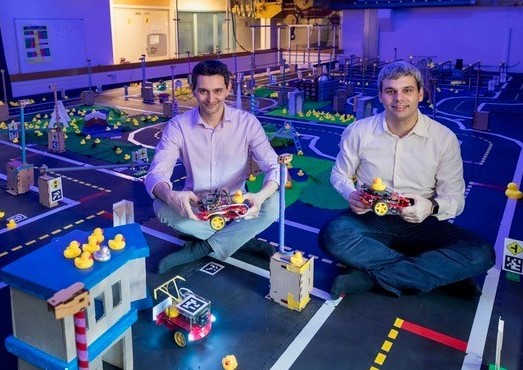Learning Autonomy with Self-Driving Cars: Duckietown goes MOOC.

(Picture: ETH, Alessandro della Bella)
Jacopo Tani and Andrea Censi are senior assistants in the research group headed by Emilio Frazzoli (D-MAVT), an internationally renowned specialist in autonomous systems. Together with Prof. Liam Paull of the University of Montreal, they lead the Duckietown project, which was conceived at the Massachusetts Institute of Technology (MIT) in 2015. The goal was to build a platform that was small-scale and cute yet still preserved the real scientific challenges inherent in a full-scale real autonomous robot platform. Duckietown is now a worldwide initiative to realize a new vision for AI/robotics education. It teaches participants to programme autonomous vehicles to navigate a structured environment using rubber ducks as the passengers of the vehicles, and has now been used by over 80 universities in 23 countries worldwide. Their next endeavor is to create a series of massive open online courses (MOOCs) focused on the science and technology of autonomy through the lens of self-driving cars. In this multi-institution project, ETH will take leadership and develop the first course of the MOOC-series.
What will the MOOC be about and what do you seek to achieve for participants?
The Duckietown MOOC series will be about autonomy, or how to make machines take their own decisions to accomplish broadly defined tasks. This topic is both intellectually fascinating and very timely given the rapid progress of robotics and AI technologies in our daily lives. Autonomy will be studied through self-driving cars, an application with disruptive social potential.
Participants will engage in a sequence of software and hardware hands-on learning experiences whose particular focus is on overcoming the challenges of deploying robots in the real world. Our hope is that participants will gain useful skills and come to appreciate and understand the challenges of this technology, while at the same time having lots of fun!
What motivated you personally to make a MOOC?
The Duckietown project was developed to make the science and technology of autonomy accessible to the broadest possible audience, not only to those learners lucky enough to have access to premiere educational institutions where these topics are addressed. Building a Duckietown MOOC experience was a logical step towards achieving the mission of the project. We are grateful for ETH-Innovedum supporting our efforts and extremely excited to bring our vision for learning autonomy to the world.
What are the unique didactic challenges?
Teaching autonomy requires a fundamentally different approach compared to many computer science and engineering disciplines. There is extensive and diverse preliminary knowledge needed to really comprehend autonomy from the “pure” mathematics and physics to “modern” machine learning based approaches. Moreover, robots are real world machines, and theory and practice do not always play well together. To see the theory work in the real world it is necessary to translate the knowledge in software architectures, and deploy them on hardware platforms. Finally, there is a proliferation of hardware platforms and software tools out there, each with its own peculiarities, strengths and shortcomings. It is not always clear what tools are worth investing time in mastering, and how this competence will translate to different platforms.
How will you overcome these challenges?
To address these barriers of entry to learning autonomy, the MOOC “Self-Driving Cars with Duckietown” will have several distinguishing features, namely:
- Competency-based
topic progression
The sequence of topics in the courses is determined by asking the question: “what is the most we can make our robot do, with the least amount of prior knowledge?” instead of “what is the best order to explain things?”. As learners progress through behaviors of increasing complexity to reach the final objective, it becomes naturally necessary to introduce new concepts and tools to address limitations to previous behaviors. This approach allows students to jump right in “the middle of things” (getting Duckiebots to do things!) and gradually re-iterate concepts through the various technical frameworks and implementation solutions that are so very important to align the theory with the practice, leading to a stronger comprehension of the how and why things happen.
- Hardware-based
hands-on learning on a standardized platform (the Duckiebot) with open-source
industry-widespread software tools
This is a robotics and AI MOOC where every participant will have the opportunity to follow along by doing real world experiments with their own robot at home. The Duckietown framework was designed, from the software stack (i.e., Python, ROS, Docker) to the Duckiebot and Duckietown city, to make the course accessible for all learners, both pedagogically and economically.
- Remote
evaluations of hardware assignments
The last, but not least, distinguishing factor of this MOOC is the use of remote facilities (the Duckietown Autolabs) where reproducible performance assessment of hardware assignments is conducted in controlled environments. This feature enables remote grading of hardware assignment, which, to the best of our knowledge, is a first ever for a robotics MOOC.
Like to know more about Autonomy with Self-Driving Cars? Course starts at March 22, 2021 and will be published on the edX-platform.
Inspired to start your own MOOC project? Please have a look at our website and contact Marinka Valkering to discuss possibilities!
Posted on , 1 Comment

